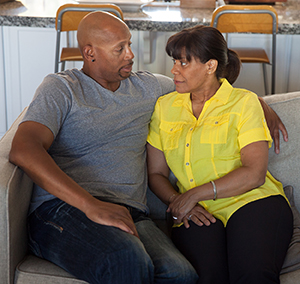A
B
C
D
E
F
G
H
I
J
K
L
M
N
O
P
Q
R
S
T
U
V
W
X
Y
Z
Topic IndexLibrary Index
Click a letter to see a list of conditions beginning with that letter.
Click 'Topic Index' to return to the index for the current topic.
Click 'Library Index' to return to the listing of all topics.
Helping Yourself Through Grief and Loss
Do what you can to stay healthy. Reaching out for support will help a great deal. You may find yourself asking, “Why?” It’s normal to seek meaning by asking questions, but there’s not always an answer for loss. With time, your loss may still be part of your life, but not the only thing in it.
Take care of yourself
Taking good care of yourself helps your body heal from the physical and emotional symptoms of grief. Pay extra attention to healthy exercise, sleep, and eating routines. What else do you need to feel better? Having family around can help you feel loved. Or you might need a walk or movie with friends to take your mind off things for a little while.
Accept support

Joining the world again is part of healing. These tips may help:
-
Stay in touch with family and friends, even if it’s hard to talk.
-
Tell people how they can help. It can be as simple as bringing you a meal or walking your dog.
-
Stick to a daily routine that keeps you connected to friends and family.
-
Try to not make major decisions. Some grief specialists suggest that you put important decisions on hold for a year after a major loss, if possible.
-
Attend a support group of people who have been through the same type of loss.
When to get help
There's no normal length of time to grieve. But if you feel stuck and unable to move on, or if it has been 6 months or more since your loss and you still have signs of grief (see below), it may be time for professional help. Seeking professional help is not a sign of weakness. It means that you are taking responsibility for your recovery. Be alert to depression and call your healthcare provider if you:
-
Can’t go to work or take care of the kids
-
Can’t eat or sleep normally
-
Can't concentrate long enough to complete tasks such as paying bills
-
Feel helpless, hopeless, or worthless
-
Lose interest in hobbies, friends, and activities that used to give you pleasure
-
Gain or lose a lot of weight
-
Feel your grief is getting worse or not getting any better
-
Have repeated thoughts of suicide or of harming yourself or others. Call or text 988. You will be connected to trained crisis counselors at the 988 Suicide & Crisis Lifeline . An online chat option is also available at . Lifeline is free and available 24/7.
At some point, you’ll begin thinking about the future. You’ll want to look ahead and make plans. To help yourself reach this point, try to do one thing each day to join in life. Keep at it, even if it feels strange at first. Your life can never be exactly the same. But one day you’ll find you’re living life more fully again.
Where to get help
Ask for the support and help that you need. Talk with your healthcare provider about resources in your area. These organizations can also offer help:
-
CaringInfo. This program from the National Hospice and Palliative Care Organization offers information about coping with loss.
-
The Compassionate Friends. This is a self-help organization offering support to families who have experienced the death of a child. Local support group information is available.
-
National Alliance for Children's Grief (NACG). NACG raises awareness about the needs of children and teens who are grieving a death. NACG can also help you locate support in your area.
-
National Institute on Aging (NIA). NIA offers free information about grief. Contact their information center by phone at 800-222-2225 or by email at niaic@nia.nih.gov.
Online Medical Reviewer:
L Renee Watson MSN RN
Online Medical Reviewer:
Marianne Fraser MSN RN
Online Medical Reviewer:
Sabrina Felson MD
Date Last Reviewed:
4/1/2023
© 2000-2024 The StayWell Company, LLC. All rights reserved. This information is not intended as a substitute for professional medical care. Always follow your healthcare professional's instructions.